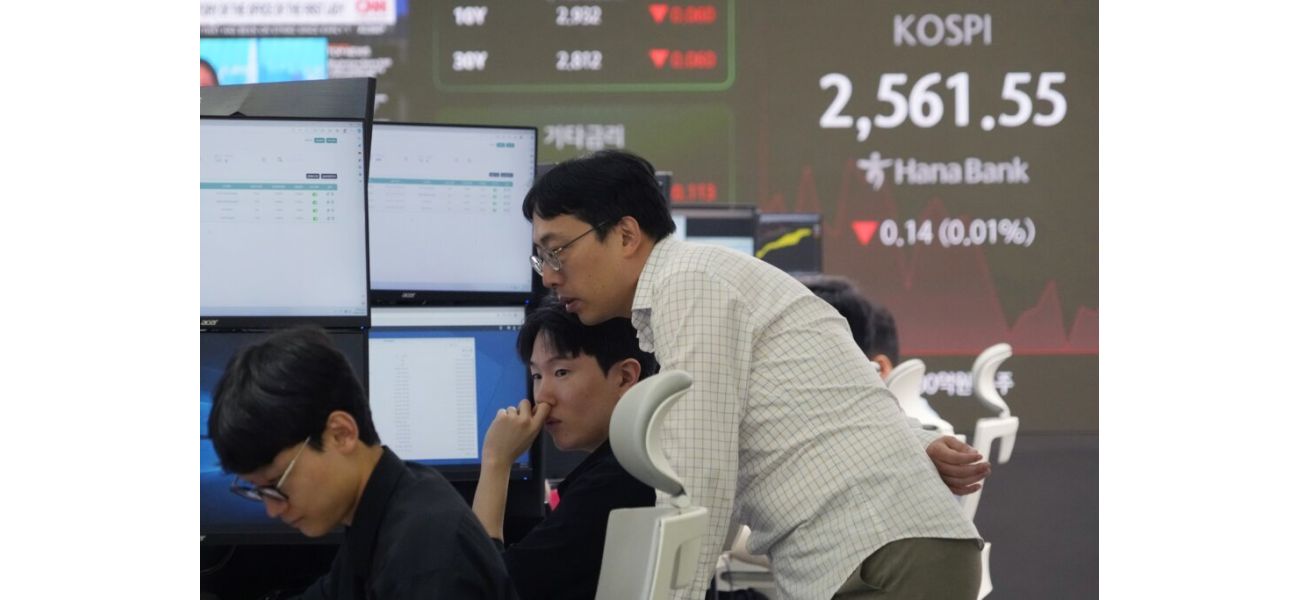Stocks rise as hiring increases in September, boosting Wall Street.
Stocks in the U.S. are rising due to positive employment data.
October 4th 2024.

Shares on Wall Street jumped after the U.S. reported much stronger jobs figures than expected early Friday. The news of a surge in hiring last month has sparked a wave of optimism, with the S&P 500 rising 0.7% and approaching its all-time high set just days ago. The Dow Jones Industrial Average was also up 0.5%, while the Nasdaq composite saw a significant 1.1% increase. This follows a sharp increase in Treasury yields in the bond market, as the government reported that employers added 254,000 more jobs in September than they had previously cut. This was a significant acceleration from August and surpassed the predictions of economists.
In a breaking news update, AP reported that shares on Wall Street were on the rise after the U.S. released stronger-than-expected jobs figures. This is a clear indication that the U.S. labor market remains solid, despite years of elevated interest rates. Futures for the S&P 500 and the Dow Jones Industrial Average rose 0.8% and 0.5% respectively, before the opening bell.
The latest data shows that America's employers added an impressive 254,000 jobs in September, compared to the 159,000 jobs added in August. This resulted in a drop in the unemployment rate from 4.2% to 4.1%, according to the Labor Department. These numbers suggest that many companies are still confident enough to continue hiring, despite the ongoing pressure of high interest rates. However, there has been a slight decrease in hiring as companies become more cautious with their recruitment processes.
The current surge in stock prices can be attributed to the hope that the U.S. economy will continue to grow, especially after the Federal Reserve announced a series of interest rate cuts. The Fed's decision to lower the main interest rate for the first time in over four years has boosted investor confidence, with expectations of more cuts in the coming year.
In other news, electric truck and SUV maker Rivian saw a significant drop in their shares after lowering their production guidance for the year due to a parts shortage. This disruption has been ongoing since the third quarter and has continued to worsen. Similarly, budget airline Spirit Airlines saw a dramatic 32% drop in their shares after reports surfaced that they were exploring bankruptcy protection. This comes after a failed merger with JetBlue earlier this year, causing their shares to hit an all-time low.
Later today, the government will release its September jobs report, which will provide further insight into the state of the U.S. labor market. There have been concerns about the job market's ability to hold up after the Federal Reserve's decision to maintain high interest rates. The Fed's goal was to control inflation without causing major job losses that could potentially lead to a recession.
In other news, dockworkers at East and Gulf coast ports will be returning to work after their union reached a deal to suspend their three-day strike until January 15th. This will allow for negotiations for a new contract to take place. Additionally, oil prices continued to rise due to escalating tensions in the Middle East. This comes after President Joe Biden suggested that the U.S. and Israel were discussing a possible strike on Iranian oil facilities.
In Europe, stock markets saw mixed results, with France's CAC 40 and Germany's DAX edging up, while Britain's FTSE 100 slipped. In Asia, Japan's benchmark Nikkei 225 and South Korea's Kospi saw slight gains, while Australia's S&P/ASX 200 slipped. Hong Kong's Hang Seng saw a significant jump, while trading was closed in Shanghai for a holiday.
In currency trading, the U.S. dollar saw a slight decrease against the Japanese yen and the euro. This follows Japanese Prime Minister Shigeru Ishiba's policy speech, where he promised salary increases for workers that exceed inflation and an economic package to support low-income households. He also plans to promote investment to create a "virtuous cycle of growth and distribution." Ishiba met with Bank of Japan Gov. Kazuo Ueda, who indicated that Japan is unlikely to make any near-term adjustments to its ultra-loose monetary policy, which has been gradually raised from near-zero. This has caused the yen to fall against the dollar in the past two days. A weaker yen can benefit Japan's exporters, but it also raises the cost of imports, leading to higher domestic prices and reduced household spending.
In a breaking news update, AP reported that shares on Wall Street were on the rise after the U.S. released stronger-than-expected jobs figures. This is a clear indication that the U.S. labor market remains solid, despite years of elevated interest rates. Futures for the S&P 500 and the Dow Jones Industrial Average rose 0.8% and 0.5% respectively, before the opening bell.
The latest data shows that America's employers added an impressive 254,000 jobs in September, compared to the 159,000 jobs added in August. This resulted in a drop in the unemployment rate from 4.2% to 4.1%, according to the Labor Department. These numbers suggest that many companies are still confident enough to continue hiring, despite the ongoing pressure of high interest rates. However, there has been a slight decrease in hiring as companies become more cautious with their recruitment processes.
The current surge in stock prices can be attributed to the hope that the U.S. economy will continue to grow, especially after the Federal Reserve announced a series of interest rate cuts. The Fed's decision to lower the main interest rate for the first time in over four years has boosted investor confidence, with expectations of more cuts in the coming year.
In other news, electric truck and SUV maker Rivian saw a significant drop in their shares after lowering their production guidance for the year due to a parts shortage. This disruption has been ongoing since the third quarter and has continued to worsen. Similarly, budget airline Spirit Airlines saw a dramatic 32% drop in their shares after reports surfaced that they were exploring bankruptcy protection. This comes after a failed merger with JetBlue earlier this year, causing their shares to hit an all-time low.
Later today, the government will release its September jobs report, which will provide further insight into the state of the U.S. labor market. There have been concerns about the job market's ability to hold up after the Federal Reserve's decision to maintain high interest rates. The Fed's goal was to control inflation without causing major job losses that could potentially lead to a recession.
In other news, dockworkers at East and Gulf coast ports will be returning to work after their union reached a deal to suspend their three-day strike until January 15th. This will allow for negotiations for a new contract to take place. Additionally, oil prices continued to rise due to escalating tensions in the Middle East. This comes after President Joe Biden suggested that the U.S. and Israel were discussing a possible strike on Iranian oil facilities.
In Europe, stock markets saw mixed results, with France's CAC 40 and Germany's DAX edging up, while Britain's FTSE 100 slipped. In Asia, Japan's benchmark Nikkei 225 and South Korea's Kospi saw slight gains, while Australia's S&P/ASX 200 slipped. Hong Kong's Hang Seng saw a significant jump, while trading was closed in Shanghai for a holiday.
In currency trading, the U.S. dollar saw a slight decrease against the Japanese yen and the euro. This follows Japanese Prime Minister Shigeru Ishiba's policy speech, where he promised salary increases for workers that exceed inflation and an economic package to support low-income households. He also plans to promote investment to create a "virtuous cycle of growth and distribution." Ishiba met with Bank of Japan Gov. Kazuo Ueda, who indicated that Japan is unlikely to make any near-term adjustments to its ultra-loose monetary policy, which has been gradually raised from near-zero. This has caused the yen to fall against the dollar in the past two days. A weaker yen can benefit Japan's exporters, but it also raises the cost of imports, leading to higher domestic prices and reduced household spending.
[This article has been trending online recently and has been generated with AI. Your feed is customized.]
[Generative AI is experimental.]
0
0
Submit Comment





